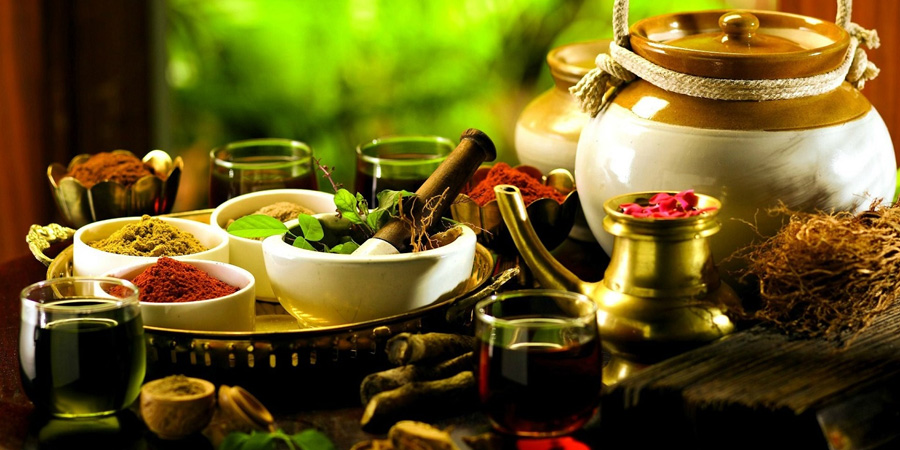Ayurveda is the eternal Vedic science of life, the traditional natural healing system of India. Today, Ayurveda is at the forefront of mind-body medicines. Ayurveda has spread far beyond its traditional base and is gaining attention throughout the world. Ayurveda with its understanding of life and consciousness becomes the medicine of the future.
Ayurveda literally means knowledge of life. Its basic principles are believed to be remembered by Brahma, the Creator himself. This wisdom in turn was handed down through mythological figures to the great seers. The written text of Ayurveda date back to many millennia and the incredibly complex and advanced concepts that embody them still form the basis of various medical systems of today. As a science of life Ayurveda attempts to set out good and bad practices of life by outlining the cause of happy and unhappy life, what is wholesome and unwholesome? It also elaborates guidelines for providing a balance to often hectic and unhealthy lifestyles of modern world.
Ayurvedic medicines are based on the principle that every individual has a unique constitution that related to his vital energies translated into Ayurvedic nosology as dosha or humors. The equilibrium of these humors depends on a variety of factors. The objective of Ayurveda is to reestablish the equilibrium when we are ill and to maintain that equilibrium in order to keep us healthy. Ayurveda explores how to heal our minds on all levels from the subconscious to super conscious along with the role of diet, exercise and many other methods to create wholeness.
Ayurveda mainly comprises of eight clinical specialties. They are: – General medicine (Kaaya cikitsaa), Pediatrics (Baala cikitsaa), Psychiatry (Bhoota vidyaa), Treatment of head and neck (S`aalakya tantra), Surgery (S`alya tantra), Toxicology (Agada tantra), Rejuvenation therapy (Rasayana tantra) and Reproductive medicine (Vajeekarana cikitsaa).
Rasaayana and vajeekarana therapies have special relevance in the modern era. As the life has been polluted and distorted in the sphere of our daily existence every natural blessings are far away from us. The line of treatment proposed as Rasaayana finds a favorable viable solution to health problems especially from a psychosomatic perspective. It cleanses the body totally, regains the active mind to its best possible working level, giving a feeling of rejuvenation. One may easily surrender oneself to the exotic divinity of the treatment.
Vajeekarana therapy is an important treatment to pull out the latent energy to create a new lineage of life. The medicines of Ayurveda touches strongly to alleviate the existing or possible hindrances whether rooted in the mind or body.
Ayurveda paved the way for surgical innovations including organ transplantation. Classical ayurvedic treatises provide us authentic descriptions of operative surgery and of the blunt and sharp instruments used for it. Susruta, the author of Susruta samhitaa, is hailed as the father of plastic surgery. His compendium stresses the need of keenness and observation to carry out various procedures on human body.
Caraka Samhitaa, Sus`ruta Samhitaa, Asht`aan’ga sangraha and Asht`aan’ga Hr`daya are renowned Ayurvedic treatises. Madhava Nidaana, Bhaavaprakaas`a, S`aarn’gadhara Samhitaa etc. also command popularity among physicians. Of these Maadhava Nidaana is a handbook of pathology while all the others are encyclopedic works on medicine and surgery. Books like Cakradatta, Yoga Ratnaakara and Bhaishajya Ratnavali are mainly books dealing exclusively with therapeutics. All these books are written in Sanskrit and various commentaries and translations of these books are also available. There is an array of books written in vernacular too.
Panchakarma is the essence of Ayurvedic treatment. It became popular due to the magical results it can bring out even on otherwise incurable diseases. Purifying the body and regaining the normal rhythm through a healthy line of treatment stipulated by regimens that attends on the body as a whole is a rare concept of medication and that is the main strength of Panchakarma. Emesis, Purgation, Oil enema, Decoction enema and Errhines form the five operative procedures of Panchakarma.
Kerala has modulated many special treatments to suit the needs of patients and to cure diseases. They include various irrigation therapies and fomentation combined with synchronized massage. Pizhichil, Navara kizhi and Siro dhaara, some of the Kerala specialties, constitute major tools in rejuvenation therapy and in providing relaxation to the stressed and strained.
India, the land of Ayurveda, strictly adopts a scientific academic method to teach Ayurveda. The Central Council of Indian Medicine, constituted by the Government of India, monitors the quality and standard of Ayurvedic education and practice.
To conclude, it may be noted that Ayurveda is not a mere science of treatment; it is a style of healthy life.

